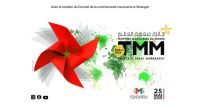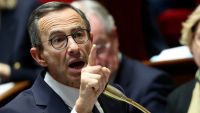BERLIN — Although she is still popular at home and respected abroad, Chancellor Angela Merkel is entering 2015 facing fresh challenges in both arenas.
Greece’s crisis threatens once more to undermine the euro and exacerbate tensions between Berlin and the European Central Bank. In Germany itself, her response to the rise of anti-immigration protests has produced a rare attack from within the chancellor’s conservative camp, and posed the perennial question about how best to confront any sentiment on the far right.
Might her 10th year in power be the year Ms. Merkel loses her touch?
As one year melted into another, Ms. Merkel showed her hand with an unusually direct riposte to anti-immigrant protesters in Dresden, whose ranks swelled to 17,500 last month. Don’t go to these marches, she warned Germans in her New Year’s address, because the organizers have “prejudice, coldness and even hatred in their hearts.”
German Chancellor Angela Merkel arriving at a European Union leaders summit in Brussels on Dec. 18.Merkel to Attack Anti-Immigrant Movement in GermanyDEC. 30, 2014
That challenge will make next Monday’s scheduled protest in Dresden a test of whether Germans heed her call. She won re-election as leader of her Christian Democratic Union with 97.7 percent of the vote at a national party congress in December, but political scientists and some in her own camp assert that she is losing touch with popular sentiment.
Outside Germany, whether dealing with the euro crisis or facing down President Vladimir V. Putin of Russia over Ukraine, Ms. Merkel has proved patient and determined, sticking to austerity, for instance, despite clamor from markets and other European leaders for a change of direction.
But dangers lurk even there. The crisis in Greece may prove more awkward this time around. Polls suggest that the winner of the snap election there on Jan. 25 could be the leftist Alexis Tsipras, who has pledged to ease social misery by renegotiating the terms of the country’s financial rescue package. For Berlin, that means at best a long haggle over a costly new deal; at worst, a rift with the Central Bank and its chief, Mario Draghi, and liability for Greece’s unpaid debts.
In 2012, it was Mr. Draghi’s pledge to do “whatever it takes” that crucially supported the euro. Now, Round 2 of the euro crisis looms with Mr. Draghi already at odds with Berlin over his widely predicted plan to purchase government bonds as the bank tries to revive Europe’s economy.
In Germany, any new money for Greece would be a hard sell to taxpayers “who still think that those ‘lazy people’ in Greece, Spain, Italy” fritter away hard-earned cash from Northern Europe, said Gero Neugebauer, a political science professor at Berlin’s Free University. The Draghi plan, though not specific to Greece, is unpopular for much the same reason.
Michael Fuchs, a senior member of Ms. Merkel’s party, warned on Wednesday that “the times when we had to rescue Greece are over.”
Potentially, the biggest challenge comes from the Alternative for Germany, a new populist party founded in 2013 on an anti-euro platform. Its leaders now threaten to unite that message with rising anti-foreigner sentiment. The platform won them seats in three state legislatures in eastern Germany this fall.
Ms. Merkel disdains the party in public, not even mentioning it in a long speech to her party congress. But last weekend, a former minister in her cabinet broke ranks. Ms. Merkel may be hugely popular now, Hans-Peter Friedrich, the former minister, told the newsmagazine Der Spiegel, but she has made a “disastrous mistake” in shifting her party left, leaving a vacuum on the right that he warned could spell “mortal danger” for established conservatives.
This criticism reeked for some of sour grapes. Mr. Friedrich, while still a senior member of Ms. Merkel’s conservative bloc, was ousted as agriculture minister last February over a complex possible breach of confidence that left him smarting.
But it went to the heart of a long-simmering question about whether Ms. Merkel, famous for her tactical skills but accused by critics of lacking strategic vision, would remain popular if times turned worse in what is Europe’s No. 1 economy.
“Turning a blind eye and staying silent is not working,” wrote the influential center-right Berlin daily Der Tagesspiegel after Mr. Friedrich’s outburst. “Angela Merkel owes her party — and the public — a few answers.”
Mr. Friedrich’s warnings contain “much more than a score to settle with Angela Merkel,” said Werner J. Patzelt, a political science professor at the Technical University in Dresden.
Watching the anti-immigrant demonstrations from close up, Mr. Patzelt sees a danger that Germany’s political leaders — who, like Ms. Merkel, support asylum for war refugees and luring immigrants needed for Germany’s work force — are losing touch with ordinary people.
Almost 50 percent of voters in Saxony did not participate in its Aug. 31 state elections, he noted. “A large share is really people who have grown apart from the political system,” he said. The establishment may have “clear rules about what one can say, or not,” Mr. Patzelt said. “But what the people really think is in large part something else.”
Ms. Merkel’s party congress delivered little on security, immigration or refugees, said Karl-Rudolf Korte, a professor at Duisburg-Essen University. On these issues, he told Deutschlandfunk radio, the Alternative for Germany “is often the voice of the silent majority.”
Mr. Friedrich openly courted anti-foreigner sentiment, criticizing particularly the decision to grant dual citizenship to children born here of foreign parents — a policy pushed on Ms. Merkel by the center-left Social Democrats in her “grand coalition” government.
“This easy attitude to citizenship is wrong, coming precisely when people are questioning their cultural identity, their home and togetherness,” he told Der Spiegel. “Germany is not just any old piece of land, settled more or less by chance by all kinds of people from all kinds of cultures.”
Ms. Merkel countered in her New Year’s remarks by extolling the virtues of “sticking together” in tough times. Proof that this works, she said, is Germany’s soccer squad, which won the World Cup in 2014 while featuring several players of foreign origin.
But Alexander Gauland, a leader of the Alternative for Germany, and so far the only German politician of some note to have attended a Dresden rally, immediately signaled that she had a fight on her hands.
By urging Germans to boycott the Dresden marches, he said, “she is condemning from on high people she doesn’t know at all.”
The New York Times









